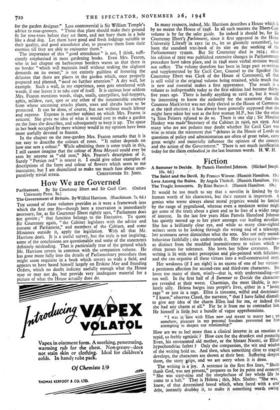How We are Governed
Parliament. By Sir Courtenay Ilbert and Sir Cecil Carr. (Oxford University Press. 5s.)
The Government of Britain. ByWilfrid Harrison. (Hutchinson. 7s. 6d.) THE second of these volumes provides as it were a framework into which the first one fits—though here a reservation is immediately necessary, for, as Sir Courtenay Ebert rightly says, "Parliament does not govern ; " that function belongs to the Executive. To quote Sir Courtenay again, "the Cabinet legislates with the advice and Consent of Parliament," and members of the Cabinet, and some Ministers outside it, apply the legislation. With all that Mr. Harrison deals. It is a useful survey, but the style is not inspiring, some of the conclusions are questionable and some of the statements definitely misleading. That is particularly true of the ground which Mr. Harrison covers in common with the companion volume. He has gone more fully into the details of Parliamentary procedure than might seem requisite in a book which covers so wide a field, and appears to have based himself largely on Erskine May and Standing Orders, which no doubt indicate usefully enough what the House may or may not do, but provide very inadequate material for a picture of what the House actually does do. In many respects, indeed, Mr. Harrison describes a House which by no means the House of 1948. In all such matters the Ilbert-Cart volume is by far the safer guide. So indeed it should be, for Si, Courtenay Ilbert's Parliament, since it first appeared in the Hornc University Librai:Sr‘in 1911 (at is., let us gloomily remember), ha been the standard text-book of its size on the working of the Parliamentary system. But Sir Courtenay died in 1924; Sinr his edition of 1920 was published extensive changes in Parliamentary procedure have taken place, and in 1948 mere verbal revision would not suffice. The volume therefore has been in large part re-written and supplemented by Sir Cecil Carr Counsel to the Speaker (Sir Courtenay Ilbert was Clerk of the house of Commons), all that is still valid in the original volume being retained, while much that is new and essential makes a first appearance. The result is a volume as indispensable today as the first edition had become thirty- five years ago. There is hardly anything to cavil at, but it would be interesting to know the authority for the statement that the Countess Markievicz was not duly elected to the House of Commons at the 1918 election ; it has always been generally supposed that she might have taken her seat as the first woman M.P., but like the other 74 Sinn Feiners refused to do so. There is one slip ; Sir Maurice Hankey was madesSecretary of the Cabinet in 1916, not 1919. And many who are not pedants may doubt whether Sir Cecil Carr was wise to retain the statement that "debates in the House of Lords on questions of policy and administration are often of great value, carry great weight and materially influence the opinion of the country and the action of the Government." There is not much justification today for the claim embodied in the last fourteen words. H. W. H.




































 Previous page
Previous page